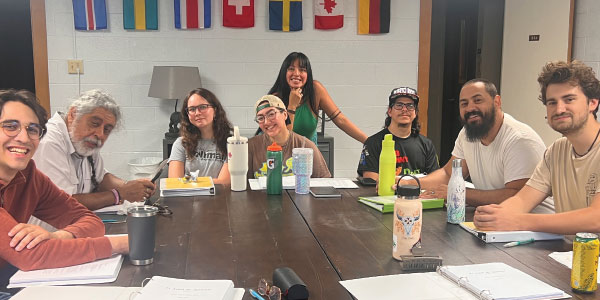By Angie Baldelomar
A full-length play in Spanish is about to debut in Kansas.
Called “The Avocado Tree,” the play will be staged Sept. 19-21 at the Lawrence Arts Center. For those who can’t attend in person, the play will be livestreamed Sept. 20.
Written by Sofiana Olivera, the play “follows the journey of three citizens who are pondering leaving their war-torn country,” with the characters caught between leaving legally or as undocumented migrants, the Lawrence Arts Center website states. Olivera is excited to finally bring her script to life, she said.
Olivera first started writing “The Avocado Tree” in 2007 as a satirical play about the process of getting a visa as a way to help her husband better understand what the process entails, she said. The play then kept evolving, turning from satire to a drama and becoming longer, she recalled. It also changed from an English-language play to a Spanish-language one.
“I primarily write in Spanish since it’s my native language,” Olivera said. “I personally feel your native language carries your emotions and feelings, and your experiences, so the words you say in your native language have more weight than any other.”
Olivera also wanted to create a Spanish-only play so that Spanish-speakers could enjoy it.
“The people who speak Spanish here and live in the state never get to enjoy a Spanish play,” she said. “I think it brings more power that they can see their experience reflected and validated onstage.”
The play, however, will have English subtitles. Thus, anyone can see it, even if they don’t speak Spanish.
Kristen Altoro, who plays the lead character, was “immediately drawn” to the story, she said.
“This is a story set in a different time, but it still transcends all these years to now – to where we are; and it’s still so important to tell, and for people to be aware of, and to just get a glimpse of what families are experiencing, and the hardships of obtaining a visa in America, and how essentially the system is set up for immigrants to fail or to just get tired of waiting,” Altoro said. “And I think that’s a harsh reality that a lot of non-Latinos don’t understand or don’t grasp.”
Altoro first heard of the play when Olivera had a readthrough of it as part of the Kansas City Public Theater’s Theater Lab Series in 2022, she said. It was the first play fully in Spanish to receive that honor. Altoro played the lead in it as well, and Olivera liked her performance, so once she knew the production was on, she offered Altoro the chance to reprise the role for the onstage production.
Thanks to her friends’ push, Olivera applied for two grants to get the play produced. She got them. Production swiftly started with the help of a Rocket Grant and a grant from the city of Lawrence, she said.
But producing a play is costly, so Olivera set up a GoFundMe as well to help with the costs. The link is still open and people can continue to donate at https://www.gofundme.com/f/the-avocado-tree-a-migrants-journey.
Play director Jerry Manan was a part of the process since the first professional readthrough, even before the play was all in Spanish. Manan felt “honored” to be asked to direct Olivera’s play, he said.
The play is important in helping to grow the Latino theater community in the Greater Kansas City area, according to Manan.
“I hope that this show inspires other Latino artists to join the community, because I know that we can tell stories, I know that we can,” he said. “It’s a big part of our culture and our history. We just need to come out and join the community.”
Tickets are $18 for general admission; $12 for students and seniors; and $9.99 for military personnel, veterans and first responders. The Sept. 20 livestream costs $9.99.
For more information about the play or to buy tickets, visit https://www.theavocadotree.org/. Tickets also are available through the Lawrence Arts Center website.
“El Árbol de Aguacate” Obra de teatro en español se estrenará en Lawrence
Una obra de teatro en español está a punto de estrenarse en Kansas.
Titulada “El Árbol de Aguacate”, la obra se presentará del 19 al 21 de septiembre en el Centro de Artes de Lawrence. Para quienes no puedan asistir en persona, la obra se transmitirá en vivo el 20 de septiembre.
Escrito por Sofiana Olivera, la obra “sigue la travesía de tres ciudadanos que reflexionan sobre su país devastado por la guerra”, con los personajes divididos entre salir legalmente o como inmigrantes indocumentados, según el sitio web del Centro de Artes de Lawrence. Olivera está emocionada de finalmente darle vida a su guion, comentó.
Olivera comenzó a escribir “El Árbol de Aguacate” en 2007 como una obra satírica sobre el proceso de obtener una visa para ayudar a su esposo a comprender mejor lo que implica dicho proceso, comentó. La obra fue evolucionando, pasando de la sátira al drama y extendiéndose, recordó. También cambió de una obra en inglés a una en español.
“Escribo principalmente en español, ya que es mi lengua materna”, dijo Olivera. “Personalmente, creo que tu lengua materna transmite tus emociones, sentimientos y experiencias, por lo que las palabras que dices en tu lengua materna tienen más peso que cualquier otra”.
Olivera también quería crear una obra exclusivamente en español para que los hispanohablantes pudieran disfrutarla.
“Las personas que hablan español aquí y viven en el estado nunca pueden disfrutar de una obra en español”, dijo. “Creo que les da más poder ver su experiencia reflejada y validada en el escenario”.
Sin embargo, la obra tendrá subtítulos en inglés. Por lo tanto, cualquiera podrá verla, incluso si no habla español.
Kristen Altoro, quien interpreta al personaje principal, se sintió “inmediatamente atraída” por la historia, dijo.
“Esta es una historia ambientada en una época diferente, pero que trasciende todos estos años hasta ahora, hasta donde nos encontramos; y sigue siendo muy importante contarla, que la gente esté al tanto y que simplemente pueda vislumbrar lo que viven las familias, las dificultades para obtener una visa en Estados Unidos y cómo, en esencia, el sistema está diseñado para que los inmigrantes fracasen o simplemente se cansen de esperar”, dijo Altoro. “Y creo que esa es una dura realidad que muchos no latinos no entienden o no comprenden”.
Altoro escuchó hablar de la obra por primera vez cuando Olivera tuvo una lectura de la obra como parte de la Serie de Laboratorios de Teatro del Teatro Público de Kansas City en 2022, comentó. Fue la primera obra completamente en español en recibir ese honor. Altoro también interpretó el papel principal, y a Olivera le gustó su actuación, así que, una vez que supo que la producción estaba en marcha, le ofreció a Altoro la oportunidad de repetir el papel en la obra.
Gracias al apoyo de sus amigos, Olivera solicitó dos subvenciones para producir la obra. Las consiguió. La producción comenzó rápidamente con la ayuda de una subvención Rocket y una subvención de la ciudad de Lawrence, comentó.
Pero producir una obra costoso, así que Olivera también creó una cuenta de GoFundMe para ayudar con los costos. El enlace sigue abierto y se puede seguir donando en https://www.gofundme.com/f/the-avocado-tree-a-migrants-journey.
El director de la obra, Jerry Mañan, formó parte del proceso desde la primera lectura profesional, incluso antes de que la obra fuera completamente en español. Mañan se sintió “honrado” de que le pidieran dirigir la obra de Olivera, comentó.
Según Mañan, la obra es importante para ayudar a expandir la comunidad teatral latina en el área metropolitana de Kansas City.
“Espero que esta obra inspire a otros artistas latinos a unirse a la comunidad, porque sé que podemos contar historias, sé que podemos”, dijo. “Es una parte importante de nuestra cultura y nuestra historia. Solo necesitamos salir y unirnos a la comunidad”.
Las entradas cuestan $18 para la entrada general; $12 para estudiantes y personas mayores; y $9.99 para militares, veteranos y personal de emergencias. La transmisión en vivo del 20 de septiembre cuesta $9.99.
Para más información sobre la obra o para comprar entradas, visite https://www.theavocadotree.org/. Las entradas también están disponibles en el sitio web del Centro de Artes de Lawrence.










